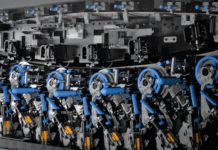Siegwerk India, a leading player in the packaging ink market, made a strong impression at this year’s Labelexpo with a blend of product innovations and service-driven solutions. The company introduced its new dual-core LED solutions, emphasizing its role in advancing the printing industry, and showcased its 360-degree printing capabilities, addressing a growing need in the market.
Ajit Singh, CFO and business unit head – NW, highlighted the company’s commitment to safety, sustainability, and technological advancements in an interview with Packaging South Asia. “Our focus on safety remains unwavering. Every ink we produce complies with stringent safety standards,” Singh said. He also unveiled two key service-oriented solutions.
Fast Match, a cloud-based ink-matching system, was a focal point of their presentation. “This tool simplifies the ink-matching process, reducing reliance on manual expertise and streamlining workflows,” Singh explained. Additionally, Siegwerk presented MyInkRoom, a digital upgrade to the traditional ink kitchen. This innovation aims to minimize press returns, optimize ink usage, and reduce waste, boosting efficiency for converters.
“These innovations reflect our dual focus on providing cutting-edge products and enhancing customer services,” Singh said.
According to Singh, UV-LED inks are still not popular as doubts remain regarding the investment. “At Siegwerk, we always promote compliant inks. We are promoting de-inking solutions focused on sustainability and recycling. We have a complete solution called Circuit where we can use the same laminate as a recyclate.
Market leadership and expo objectives
Siegwerk India holds a dominant position in the narrow-web segment, serving nearly all major converters in the country. With a portfolio spanning flexo, water-based, UV flexo, and UV letterpress solutions, the company is well-equipped to meet diverse industry needs.
“Labelexpo is a critical event for the narrow-web industry. It allows us to strengthen relationships with existing customers and connect with new prospects,” Singh stated.
Although narrow web contributes about 10-11% of Siegwerk India’s total volume, its strategic importance to the company’s profitability and technological innovation is significant.
“This segment isn’t about volume; it’s about value. The technical and service requirements are high, allowing us to deliver greater impact through our expertise,” Singh explained.
Growth trends in the narrow-web market
Singh identified strong growth trends in India’s narrow-web market, which is outpacing GDP growth. He attributed this to the segment’s connection to the packaging industry, which is witnessing a surge in demand.
“In-mold labeling (IML) and shrink sleeves are emerging as key growth drivers. For instance, the ice cream segment is expanding rapidly, with IML applications for cones and wrappers gaining traction,” Singh said. While traditional pressure-sensitive labels (PSL) maintain stable growth, newer applications are adding momentum to the sector.
Singh said they had a good show with the stand busy with customers and prospective buyers, adding LMAI and the Labelexpo team had put up a fantastic exhibition.
“The label industry in India will grow because labels are related to packaging and packaging will grow as the economy grows. Labels are not limited to pressure-sensitive labels but moving into new areas such as LED with most of the products going water-based,” he said.
Future outlook
Looking ahead, Siegwerk India expects to sustain growth rates above GDP levels, targeting 10% annual growth despite its already significant 35% market share.
“Our robust position makes higher growth a challenge, but the market’s momentum and demand for innovation keep us optimistic,” Singh said.
Siegwerk’s main plant is located in Bhiwadi in Rajasthan – just 70 kms from Delhi. Its offices and warehouses are spread across the country. From India, Siegwerk supplies to Bangladesh, Sri Lanka and parts of the Middle East. Siegwerk has plants in China and South East Asia, Singh said, adding the company is present in major metro cities such as Bengaluru, Noida, Chennai, and Mumbai.
Shardul Sharma with inputs from Priyanka Tanwar











